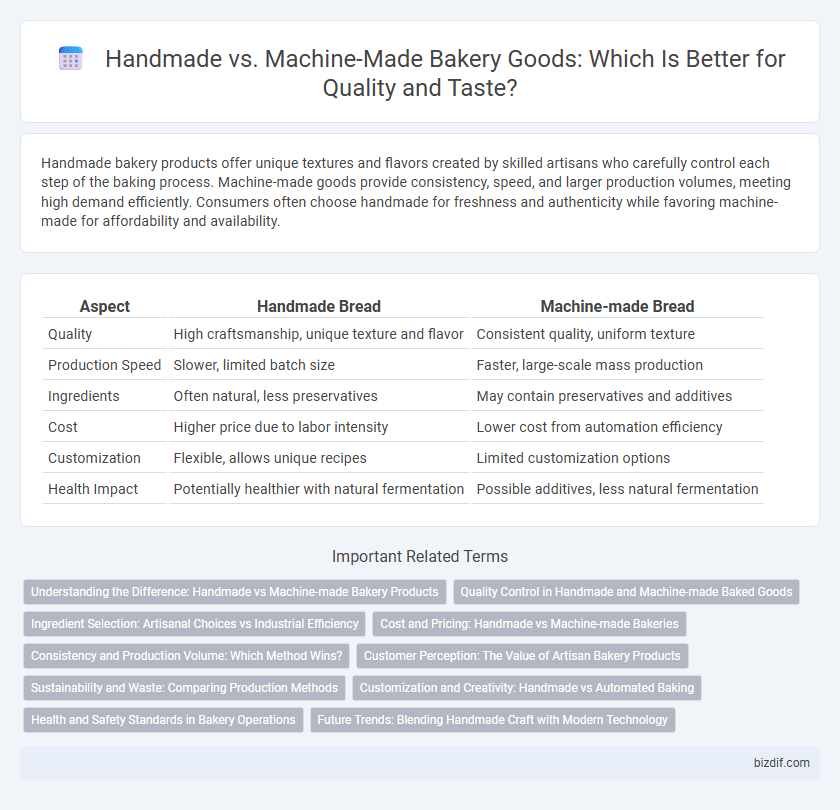Handmade bakery products offer unique textures and flavors created by skilled artisans who carefully control each step of the baking process. Machine-made goods provide consistency, speed, and larger production volumes, meeting high demand efficiently. Consumers often choose handmade for freshness and authenticity while favoring machine-made for affordability and availability.
Table of Comparison
| Aspect | Handmade Bread | Machine-made Bread |
|---|---|---|
| Quality | High craftsmanship, unique texture and flavor | Consistent quality, uniform texture |
| Production Speed | Slower, limited batch size | Faster, large-scale mass production |
| Ingredients | Often natural, less preservatives | May contain preservatives and additives |
| Cost | Higher price due to labor intensity | Lower cost from automation efficiency |
| Customization | Flexible, allows unique recipes | Limited customization options |
| Health Impact | Potentially healthier with natural fermentation | Possible additives, less natural fermentation |
Understanding the Difference: Handmade vs Machine-made Bakery Products
Handmade bakery products showcase artisanal techniques, emphasizing unique textures, flavors, and craftsmanship that machines often cannot replicate. Machine-made bakery items benefit from consistent quality, higher production speed, and scalability, meeting large-scale demand efficiently. Understanding the difference helps consumers appreciate the value of traditional methods versus industrial efficiency in bakery offerings.
Quality Control in Handmade and Machine-made Baked Goods
Handmade baked goods undergo meticulous quality control through skilled bakers who monitor texture, flavor, and appearance, ensuring each item meets high standards. Machine-made products rely on automated systems and sensors to maintain consistency and uniformity, though they may lack the nuanced adjustments a human baker can make. This contrast highlights the artisanal precision in handmade goods versus the scalability and repeatability in machine-made production.
Ingredient Selection: Artisanal Choices vs Industrial Efficiency
Handmade bakery products emphasize artisanal ingredient selection, often using organic, locally-sourced, and high-quality components to enhance flavor and nutritional value. Machine-made goods prioritize industrial efficiency by utilizing standardized, cost-effective ingredients that ensure consistency across large batches. The choice between these methods impacts the final product's texture, taste, and consumer appeal in distinct ways.
Cost and Pricing: Handmade vs Machine-made Bakeries
Handmade bakeries typically incur higher production costs due to labor-intensive processes, resulting in premium pricing for artisanal quality and unique flavors. Machine-made bakeries benefit from economies of scale, reducing expenses on labor and boosting efficiency, which allows for more competitive pricing. Consumers often pay more for handmade baked goods, valuing craftsmanship and ingredients, whereas machine-made products cater to budget-conscious customers seeking consistent quality and availability.
Consistency and Production Volume: Which Method Wins?
Handmade bakery products offer unique textures and flavors but often lack consistency in size and shape due to variability in human technique. Machine-made baked goods ensure uniformity and precise quality control, supporting large-scale production volumes essential for commercial demand. For bakeries prioritizing consistency and high output, automated processes typically outperform handmade methods in meeting market expectations.
Customer Perception: The Value of Artisan Bakery Products
Customers perceive handmade bakery products as superior in quality and authenticity compared to machine-made goods, often associating artisan techniques with freshness and unique flavors. The craftsmanship involved in handmade baking enhances the product's appeal, fostering emotional connections and a sense of trust in traditional methods. This perceived value translates into a willingness to pay premium prices for items that showcase skilled artisanship and natural ingredients.
Sustainability and Waste: Comparing Production Methods
Handmade bakery goods typically generate less waste due to smaller batch sizes and precise ingredient use, promoting sustainability through reduced overproduction. Machine-made products often rely on mass production, which can lead to increased food waste and higher energy consumption, posing challenges for eco-friendly practices. Emphasizing artisanal methods aligns with sustainable goals by encouraging resource efficiency and minimizing environmental impact.
Customization and Creativity: Handmade vs Automated Baking
Handmade baking allows for unparalleled customization and creative expression, enabling bakers to experiment with unique flavors, shapes, and decorations tailored to individual preferences. Machine-made baking excels in consistency and efficiency but often lacks the nuanced touch that bespoke, artisanal products provide. The subjective artistry in handmade goods contrasts with the standardized output of automation, making craftsmanship a key differentiator in bakery customization and creativity.
Health and Safety Standards in Bakery Operations
Handmade bakery products often prioritize traditional techniques that reduce exposure to industrial chemicals, promoting natural ingredient integrity and safer consumption. Machine-made goods follow stringent health and safety standards, including automated sanitation processes and consistent temperature controls that minimize contamination risks. Both methods adhere to regulatory guidelines, but handmade items may offer enhanced quality control through meticulous, manual inspection of raw materials and final baked goods.
Future Trends: Blending Handmade Craft with Modern Technology
Future trends in bakery increasingly emphasize the integration of artisanal techniques with advanced machinery, enhancing both product quality and production efficiency. Bakeries adopting hybrid approaches leverage automation for repetitive tasks while preserving the distinct flavors and textures achieved through handmade processes. This fusion promotes sustainable practices and satisfies growing consumer demand for authentic, handcrafted baked goods supported by consistent quality control.
Handmade vs Machine-made Infographic

 bizdif.com
bizdif.com